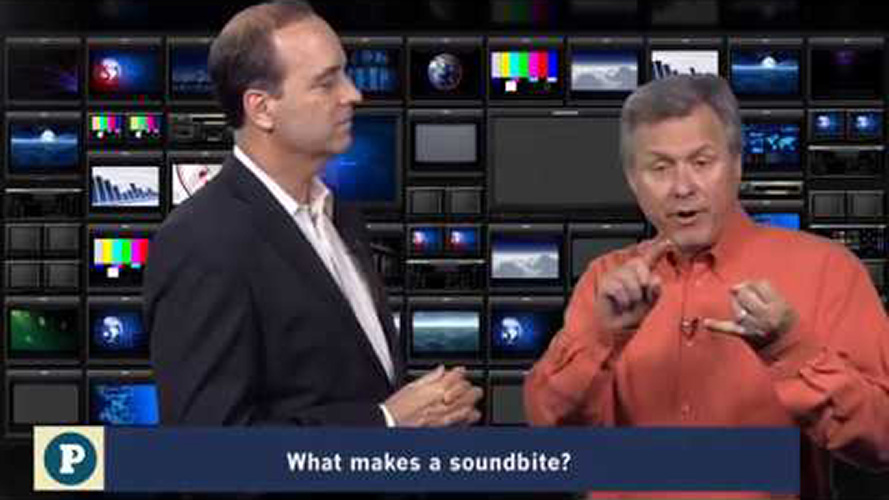What Makes A Soundbite?
Before going into a media interview, it’s important to know how broadcast editors work and what they’re looking for in the short snippets that make it into the news. Predictive Media Network trainers Ron Oliveira and Russ Rhea share some advice on how to deliver the perfect soundbite.
Russ Rhea: Hi, thanks a lot for watching. For this edition we are joined by our Predictive Media Network colleague, Ron Oliveira. Ron, I wanted to have you join us on this segment because a great question came up the other day in one of our media trainings. Client asked, how is it that reporters decide which soundbites or which quotes to take out of an interview to put in their story?
Ron Oliveira: Great question, too.
Russ Rhea: Yeah, and you used to make a living out of picking soundbites in your tour as a reporter.
Ron Oliveira: Many, many times either for news reports that I would do, from interviews that I would do. Also, photographers or other reporters would share interviews with me and say, “Ron, can you help me pick a sound bite?”
Russ Rhea: What was the thing that you looked for or listened for?
Ron Oliveira: A summation. What is it that the person being interviewed, what’s the most important thing that they said that summed it up in a short amount of time? What makes a bold statement that the viewer is going to remember? A summation in a short amount of time, 10, 15 seconds and it can say it all. I think we have a clip we’re going to show, right?
Russ Rhea: Yeah. This is an example here, a recent story in Austin about a new facility that will soon open to house about 50 homeless people, a residential facility that also includes mental health services and things. The spokesperson did a nice job in a short amount of time summing it all up, the impact on the audience. Let’s take a look.
Speaker 1: The 40,000 square foot complex will be able to house 50 individuals.
Ellen Richards: It’s important to Austin to improve everyone’s quality of life and it saves us money.
Ron Oliveira: A very, very strong statement by Ellen Richards there and in less than 10 seconds.
Russ Rhea: Yeah, and she really hit on two different things in that short amount of time. Number one, it’s important to improve everyone’s quality of life and it saves us money. Two different things that could impact the audience, not only …
Ron Oliveira: That’s what she wanted the viewers to know, that was what was most important in her mind. Okay, why did the reporter pick that? Because of that too. Reporters are looking, “How does this benefit our audience? What do they need to know from this person that I’m interviewing about this particular story?” Anybody that’s being interviewed by a reporter let me tell you this. If an interview goes on for 10 minutes, 15 minutes or so it’s because of two things; number one, the reporter is probably brand new into the business and feel that they have to ask a lot of questions; or number two, and this is the main answer here, they haven’t heard a soundbite from you.
If you ever see a reporter that looks over at you when you have said something that you may feel is significant, and they wince or they look over at their photographer to make a notation of that you have just given them a soundbite.
Russ Rhea: Yeah, it’s a very common complaint. I might say that a client says, “You know what, I talked to that reporter …”
Ron Oliveira: Forever.
Russ Rhea: “For 45 minutes and that’s the one thing they picked to use from me?” It may not have been something they thought was important. That’s why we recommend to people to go in with a plan. Think of the most important thing, basically your headline message that you want to get across to the audience, that you’d want them to use. You have to also take into consideration how it impacts the audience …
Ron Oliveira: Without a doubt.
Russ Rhea: That’s what the reporter’s looking for.
Ron Oliveira: Headline message, keep that in mind constantly. It’s what you say at the very beginning and it’s what you say at the very end of the interview. It reinforces in the reporter’s mind that that’s what you want the audience to hear.
Russ Rhea: Okay, very good. Ron, thanks for joining us at this time.
Ron Oliveira: By all means, Russ, anytime.
Russ Rhea: All right, and thanks for watching.

